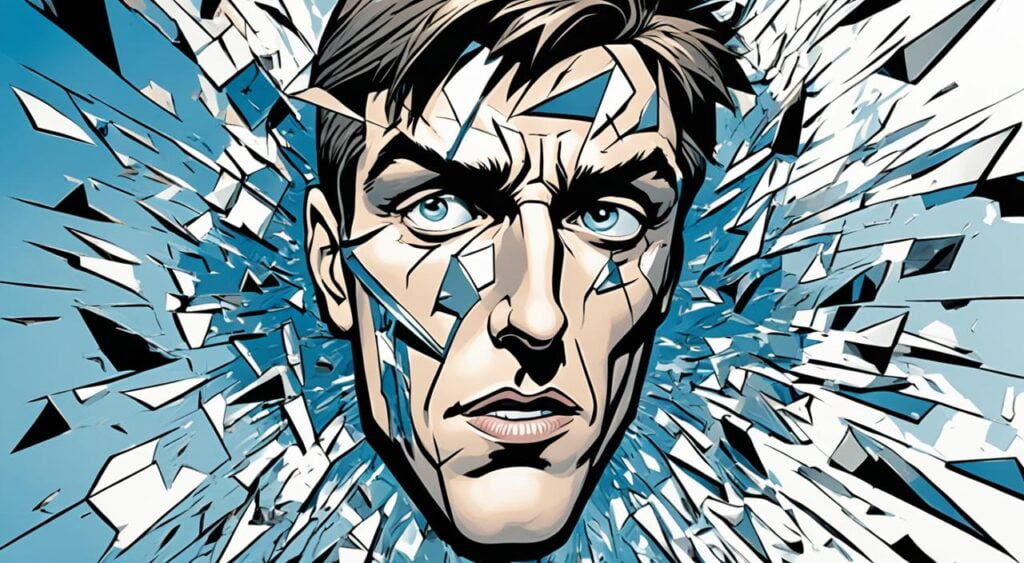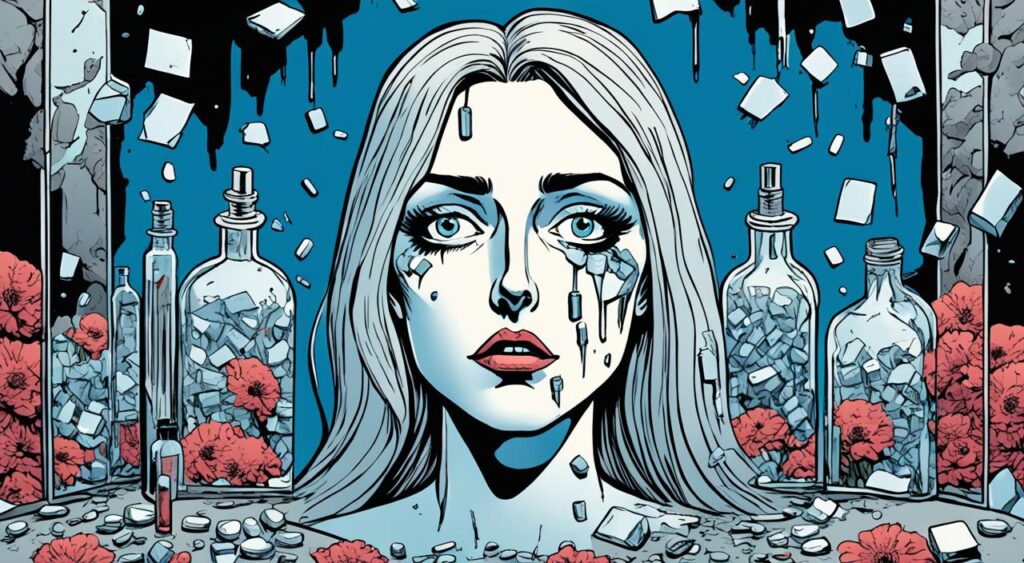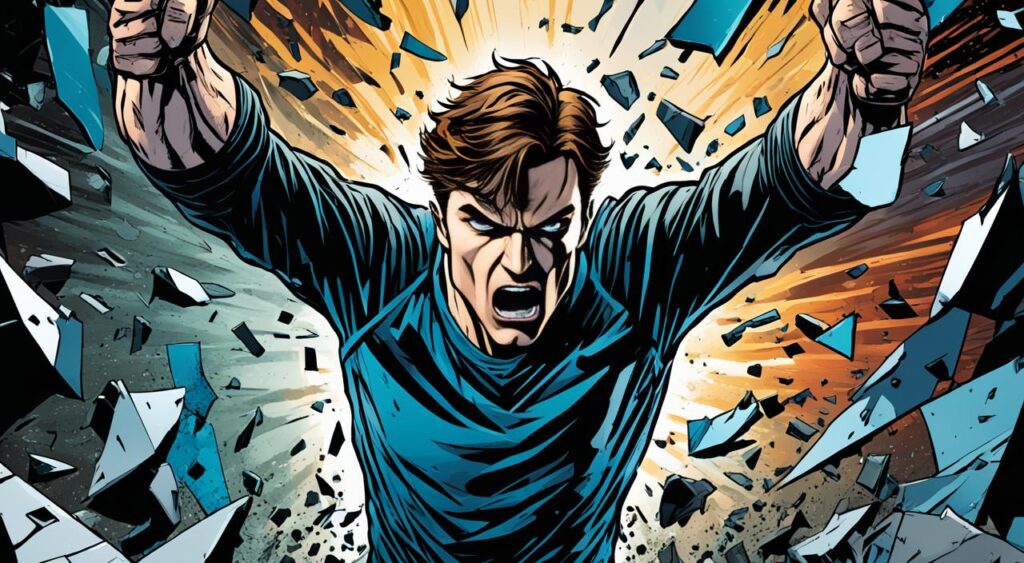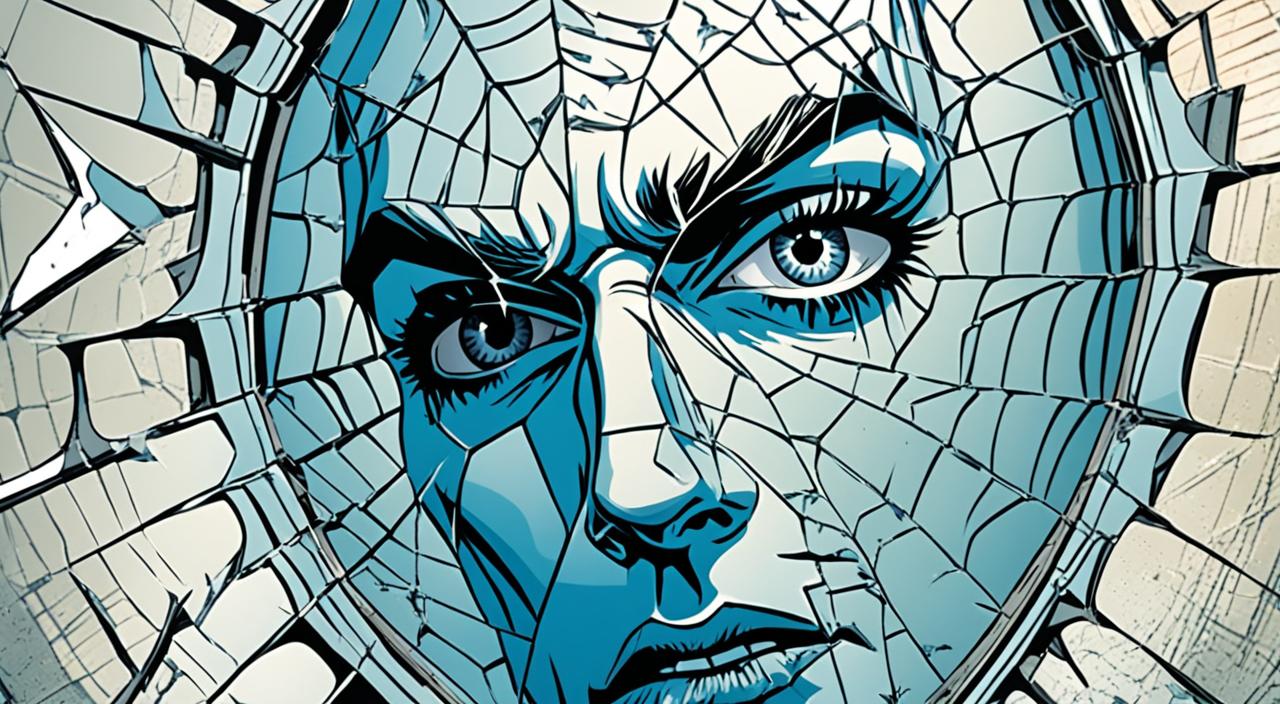Ever wondered what’s behind a narcissist’s big ego? People with narcissistic personality disorder (NPD) are often seen as arrogant and entitled. But, they might be hiding deep feelings of depression1. So, what does a depressed narcissist look like, and how can we understand this mix of traits?
Key Takeaways
- Narcissistic personality disorder (NPD) is marked by grandiosity, a lack of empathy, and a constant need for admiration.
- Narcissists can feel depressed when reality doesn’t match their self-image or give them the praise they want.
- Things like fragile self-esteem, feeling ignored, and ongoing stress in relationships make narcissists more likely to be depressed.
- Depressed narcissists might show signs of emotional ups and downs, being overly self-focused, and being very sensitive to criticism.
- Getting help and finding ways to boost self-esteem are key for narcissists dealing with depression.
Understanding Narcissistic Personality Disorder
Narcissistic personality disorder (NPD) is a complex condition. It’s marked by a grandiose sense of self-importance and a lack of empathy. People with NPD often crave admiration and show grandiose behaviors, feeling superior2. They struggle with emotional regulation, getting upset easily by criticism or perceived slights2. Their self-absorption and inability to see others’ needs and feelings cause relationship problems2.
Lack of Empathy and Grandiose Behavior
Those with NPD show a deep lack of empathy, struggling to understand or connect with others’ feelings2. They believe they are superior and entitled, deserving special treatment2. This can show in exaggerated achievements, a sense of entitlement, and a constant need for admiration and validation2.
Emotional Dysregulation and Self-Absorption
People with NPD often have trouble controlling their emotions, getting easily upset or angry when things don’t go their way2. Their self-absorption and lack of empathy make it hard to keep healthy relationships, as they don’t see things from others’ perspectives2. This can lead to feeling confused, discouraged, and not validated, causing depressive symptoms.
“Narcissists are masters of manipulation, using charm, charisma, and intimidation to get their way.” – Dr. Ramani Durvasula
- Narcissistic personality disorder affects more males than females3.
- The disorder often starts in the teens or early adulthood3.
- Some kids may show narcissistic traits, but it’s normal for their age and doesn’t always mean they’ll have the disorder3.
- Those with narcissistic personality disorder may face relationship issues, work or school problems, depression, anxiety, other personality disorders, anorexia, physical health issues, drug or alcohol misuse, and suicidal thoughts or actions3.
Narcissism and Depression: A Complex Interplay
The link between narcissism and depression is complex. People with narcissistic traits often have a fragile self-esteem. This makes them very sensitive to feeling not valued by others4. When they don’t get the admiration they want, they might feel sad, empty, lonely, and isolated. These are signs of depression4.
The pandemic has made this situation worse. More people are showing narcissistic behaviors and mood disorders4. They react to feeling helpless and hopeless by acting narcissistic. Mood disorders, like depression, are becoming more common. Some people had mood issues before, like cyclothymia and dysthymia4.
Fragile Self-Esteem and Perceived Lack of Validation
At the heart of this issue is the fragile self-esteem of those with narcissistic traits. When their high self-image isn’t backed up by others, they might fall into depression. They struggle to accept their real self compared to how they see themselves.4 This can start a cycle that makes their self-esteem even weaker and worsens depression.

“Narcissistic Personality Disorder (NPD) is diagnosed in between 2% and 16% of the population in clinical settings, which translates to between 0.5-1% of the general population.”5
Understanding the complex relationship between narcissism and depression is key. Recognizing how fragile self-esteem and feeling not valued affect them helps us. This way, we can support those facing both challenges better.
Grandiose vs. Vulnerable Narcissism
There are two main types of narcissism: grandiose and vulnerable. Grandiose narcissism is all about feeling superior and needing lots of praise. These people often ignore others’ feelings6. It’s not in the DSM-5 but is seen in people who are successful and always want to be admired6.
Vulnerable narcissism is different. It’s about feeling bad about oneself and being very sensitive to criticism. This can lead to acting out or being passive when upset6. Studies show that grandiose narcissists blame others and don’t listen to advice. They also don’t mind criticism as much as vulnerable narcissists6.
“Grandiose narcissists may blame others for their poor decisions, ignore expert advice, and are less bothered by criticism compared to vulnerable narcissists.”6
Both types lack empathy and don’t take criticism well. But, they show it in different ways67. Grandiose narcissists act arrogant and crave attention. They love money and power. Vulnerable narcissists hide their feelings and don’t ask for help well67.

Dealing with grandiose narcissists can hurt your mental health. It can lead to anxiety, depression, and feeling bad about yourself6. To protect yourself, set limits, don’t fight over power, take care of yourself, and think about seeing a therapist if it’s hard6.
What does a depressed narcissist look like
People with narcissistic personality disorder (NPD) show a mix of symptoms, including feeling depressed. They may act like they’re superior but can also feel bad about themselves and have trouble controlling their emotions8.
A depressed narcissist might feel sad, empty, hopeless, irritable, and lose interest in things. They might even think about suicide8. But their depression is often triggered by specific events and they tend to blame others for their feelings8.
Symptoms of Depression in Narcissists

Narcissists can feel different types of depression. These include feeling sad when they lose something important, doubting their worth, and feeling empty inside8. These feelings can come from losing the attention they crave, facing criticism, or realizing they’re not perfect8.
Some narcissists might even hate themselves or act in ways that hurt their own goals8. In extreme cases, they might start to see or believe things that aren’t real, or become overly suspicious8.
It’s key to understand that narcissists’ depression is different from regular depression8. Knowing how depression shows in narcissists helps doctors and therapists help them better.
Narcissistic Injury and Rage
People with narcissistic personality disorder (NPD) are very sensitive to criticism or what they see as humiliation. This is called narcissistic injury9. If their high self-image or feeling of being better than others is challenged, they might get very angry or want revenge. This is known as narcissistic rage10.
They have a fragile self-esteem and can’t handle criticism well9. Instead of dealing with their feelings in a healthy way, they might attack others. They blame others for how they feel not good enough10.
Hypersensitivity to Criticism and Perceived Humiliation
People with narcissistic traits need a lot of praise and admiration from others10. If they feel criticized or not respected enough, they can get very angry. They see these criticisms as a personal attack on their self-worth9. This makes them act out, sometimes being mean or violent10.

These outbursts might not look like depression, but they come from feeling helpless and sad9. The narcissist can’t control their feelings and blames others for their problems. This leads to ongoing arguments and bad feelings10.
“Narcissistic rage is characterized by intense anger triggered by a threat to a person’s sense of self, often leading to physical or verbal abuse, manipulation, or passive-aggressive behavior.”
Covert Narcissism and Depressive Episodes
People with covert narcissism might feel more depressed than those with grandiose narcissism11. This is because they often keep their feelings inside and feel bad for a long time11. They also might feel the need to be perfect, which can make them feel more depressed11.
Covert narcissism means they focus on themselves and want attention11. They can be very sensitive to criticism and find it hard to make friends11. They also might talk down about themselves to get sympathy11. Many of them spend a lot of time on social media, where they can be very sensitive to what others say11.
Studies show that depression and anxiety are more common in those with covert narcissism than in overt narcissism11. These individuals often act humble but still want people to admire and praise them11. They might also act self-critical to get people to feel sorry for them11.
People with high scores on covert narcissism tend to hold in their feelings more often, which can lead to feeling depressed11. To deal with covert narcissism, it’s important to notice and change negative behaviors11.
“A 2018 study found that people with overt narcissism tended to have higher levels of self-esteem, while those with covert narcissism had lower scores.”12
Covert narcissism can be hard to spot because it’s not as obvious as other types13. It’s marked by being very sensitive, expecting special treatment, and not being very empathetic13. They might seem nice and competent in public but act differently in private, leading to a “double life”13.
Covert narcissists usually care more about their own feelings and needs than others13. They might act down on themselves to keep control and get approval13.
- They can get jealous easily, fixating on what others have and finding it hard to be happy with their own stuff or achievements13.
- They often ignore the emotional needs of others, making it hard to connect deeply13.
- They might use gaslighting to make others doubt their own perceptions13.
Dealing with covert narcissism and depression needs a careful and thoughtful approach11. Knowing how covert narcissists act can help people handle these tricky situations better and find the right support and help11.
Reactive Depression and Situational Symptoms
People with narcissistic personality disorder might often feel reactive or situational depression. This means their feelings of sadness are linked to what’s happening around them14. They might feel down when they face criticism or feel slighted, but these feelings can change quickly14.
This is different from the deep, ongoing sadness of clinical depression without a personality disorder.
Fluctuating Moods and External Triggers
Depression in narcissists can be triggered by certain events or situations14. They might feel sad, irritable, or just not care about things14. Their daily life can change too, like eating or sleeping poorly, feeling tired, or making unhealthy choices14.
But these feelings might not last long after the event that triggered them, unlike the ongoing sadness of major depression.
Using healthy ways to cope, like meditation or yoga, can help with these feelings14. Getting help from therapists who know about narcissism and depression can also be key in managing these mood swings and triggers15.
“Reactive depression is a form of depression that is triggered by specific external events or situations, in contrast to the more persistent, self-directed symptoms of clinical depression.”
Seeking Professional Help
People with narcissistic personality disorder (NPD) and depression might find it hard to get help. They are very sensitive to criticism and want a lot of praise. But, it’s key to see a mental health expert to deal with narcissism and depression symptoms16.
Importance of Therapy and Treatment
Cognitive-behavioral therapy (CBT) can help those with NPD. It teaches better ways to cope, improve relationships, and value oneself more16. This is very useful since people with NPD often find it hard to see their own flaws and accept change16.
Therapy can also tackle the deep issues causing depression, like feeling bad about oneself and not feeling valued16. With a therapist’s help, they can better handle their feelings and build a stronger sense of self-worth16.
“Seeking professional help is the first step towards understanding and managing the complex interplay between narcissism and depression.”
Treatment for narcissism and depression might include therapy, medicine, and changing one’s lifestyle17. Activities like yoga and mindfulness meditation can also help those with NPD17.
Getting better is not easy, but with the right support and treatment, people with NPD and depression can manage their symptoms and feel better overall16.
Self-Validation and Recovery
Recovering from narcissism and depression is tough but empowering. It’s about learning to value yourself, not just by what others think18.
People with narcissistic personality disorder often feel their self-worth depends on others’ praise19. Learning to value themselves helps them escape the ups and downs of emotional reactions and depression18.
This change means accepting and being kind to oneself, valuing personal strengths and successes. It’s about taking back your own value, not needing others to give it to you. As they learn to value themselves, they find more stability and happiness, which helps with depression18.
Getting better from narcissism and depression is hard, but key to taking back control of your life. With help from mental health experts, self-reflection, and a push to change old ways, you can start healing and growing.
“The greatest weapon against stress is our ability to choose one thought over another.” – William James
Conclusion
The link between narcissistic personality disorder (NPD) and depression is complex and not well understood. People with NPD might feel depressed because they have low self-esteem and don’t get the validation they want. They also struggle to handle negative feelings in a healthy way20. Both grandiose and vulnerable types of narcissism can show signs of depression, but they may show it differently20.
Knowing how a depressed narcissist acts, like having trouble controlling emotions, self-destructive behavior, and even violence21, helps those affected get help. A therapist who knows about personality disorders can give them the help they need. This includes learning to deal with abuse, setting boundaries, and building self-esteem20.
To beat the mix of narcissism and depression, focusing on self-worth, finding better ways to cope, and growing personally is key. Taking care of oneself, doing things that make one happy, and being around supportive people are important steps towards getting better20.
FAQ
What is narcissistic personality disorder?
Narcissistic personality disorder (NPD) is a condition marked by a deep sense of self-importance. It also includes a lack of empathy and a constant need for admiration.
What are the symptoms of narcissistic personality disorder?
Signs of NPD include feeling superior, acting like a victim, being arrogant, and manipulating others. People with NPD often struggle with managing their emotions and focus too much on themselves.
How is narcissism related to depression?
The link between narcissism and depression is complex. Those with narcissistic traits may have low self-esteem and feel unvalued by others. This can lead to depression.
What are the subtypes of narcissism?
There are two main types of narcissism: grandiose and vulnerable. Grandiose narcissism is more open and assertive. Vulnerable narcissism is more self-critical but still superior.
What does a depressed narcissist look like?
Depressed narcissists can show signs similar to clinical depression. These include feeling sad, empty, hopeless, irritable, and losing interest in activities. They may also feel very tired and have thoughts of suicide.
What is narcissistic injury?
A narcissistic injury is when someone with NPD feels criticized or belittled. They can feel deeply hurt and respond with anger, disdain, or revenge.
Are covert narcissists more prone to depression?
Yes, research suggests that those with vulnerable narcissism might be more likely to have depression. This is because they often struggle with intense emotions and negative feelings.
How does the depression of a narcissist differ from clinical depression?
Narcissistic depression is often triggered by external events and can change quickly. It’s different from clinical depression, which is deeper and more constant.
Why is it important for narcissists to seek professional help?
People with narcissistic personality disorder and depression may not want to get help. But it’s key for managing their symptoms. Therapy can teach them better ways to cope and value themselves.
How can self-validation help in the recovery process?
Learning to value oneself is crucial for those with narcissistic personality disorder and depression. It helps them build a stable sense of self and reduce emotional ups and downs.
Source Links
- Exploring the relationship between narcissism and depression: The mediating roles of perceived social support and life satisfaction – https://www.sciencedirect.com/science/article/abs/pii/S0191886920307959
- Can Depression Occur in Narcissism? – https://psychcentral.com/depression/narcissism-and-depression
- Narcissistic personality disorder – Symptoms and causes – https://www.mayoclinic.org/diseases-conditions/narcissistic-personality-disorder/symptoms-causes/syc-20366662
- Is Narcissism Like Bipolar or Depression, Mood Disorder? (Addiction, Depression, Suicide, Webinar) – https://vaknin-talks.com/transcripts/Is_Narcissism_Like_Bipolar_or_Depression_Mood_Disorder_Addiction_Depression_Suicide_Webinar/
- What are the Five Types of Narcissism and How Do They Affect Different Types of Relationships – https://www.aplaceofhope.com/what-are-the-five-types-of-narcissism-and-how-do-they-affect-different-types-of-relationships/
- What Is Grandiose Narcissism? – https://www.verywellmind.com/what-is-grandiose-narcissism-7112083
- Why Are Narcissistic People Prone to Depression? – https://www.psychologytoday.com/us/blog/experimentations/202002/why-are-narcissistic-people-prone-to-depression
- The Depressive Narcissist (Narcissism, Depression, and Dysphoria) – https://www.healthyplace.com/personality-disorders/malignant-self-love/the-depressive-narcissist-narcissism-depression-and-dysphoria
- From Pain to Rage: The Signs of Narcissistic Collapse – https://psychcentral.com/disorders/narcissistic-personality-disorder/narcissistic-collapse
- What Is Narcissistic Rage? – https://www.verywellmind.com/what-is-narcissistic-rage-5183744
- 6 Traits of Covert Narcissism – https://health.clevelandclinic.org/covert-narcissism
- Covert narcissist: Traits, causes, and how to respond – https://www.medicalnewstoday.com/articles/covert-narcissist
- Debunking Covert Narcissism: Recognizing Signs & Effects – https://medcircle.com/articles/signs-of-covert-narcissism/
- Reactive Depression Explained | Coping With Stressful Events – https://www.pillarsrecovery.com/rehab-blog/reactive-depression-explained/
- Depression and the Narcissist | HealthyPlace – https://www.healthyplace.com/personality-disorders/malignant-self-love/depression-and-the-narcissist
- “How to Help a Narcissist” Ask a Therapist — Talkspace – https://www.talkspace.com/mental-health/conditions/narcissistic-personality-disorder/how-to-help/
- What Is Narcissism? – https://www.webmd.com/mental-health/narcissistic-personality-disorder
- When Narcissistic Behavior Is Caused By Something Else – https://www.psychologytoday.com/us/blog/love-in-the-age-narcissism/202210/when-narcissistic-behavior-is-caused-something-else
- How to Escape a Narcissistic Abuse Cycle – https://www.verywellmind.com/narcissistic-abuse-cycle-stages-impact-and-coping-6363187
- What Does Narcissism Look Like in a Relationship? | Counseling Center Group – https://counselingcentergroup.com/narcissism-in-a-relationship/
- How to Spot Narcissism and Depression – https://overcomewithus.com/narcissist-personality/how-to-spot-narcissism-and-depression








I always enjoy your posts. Keep up the great work!